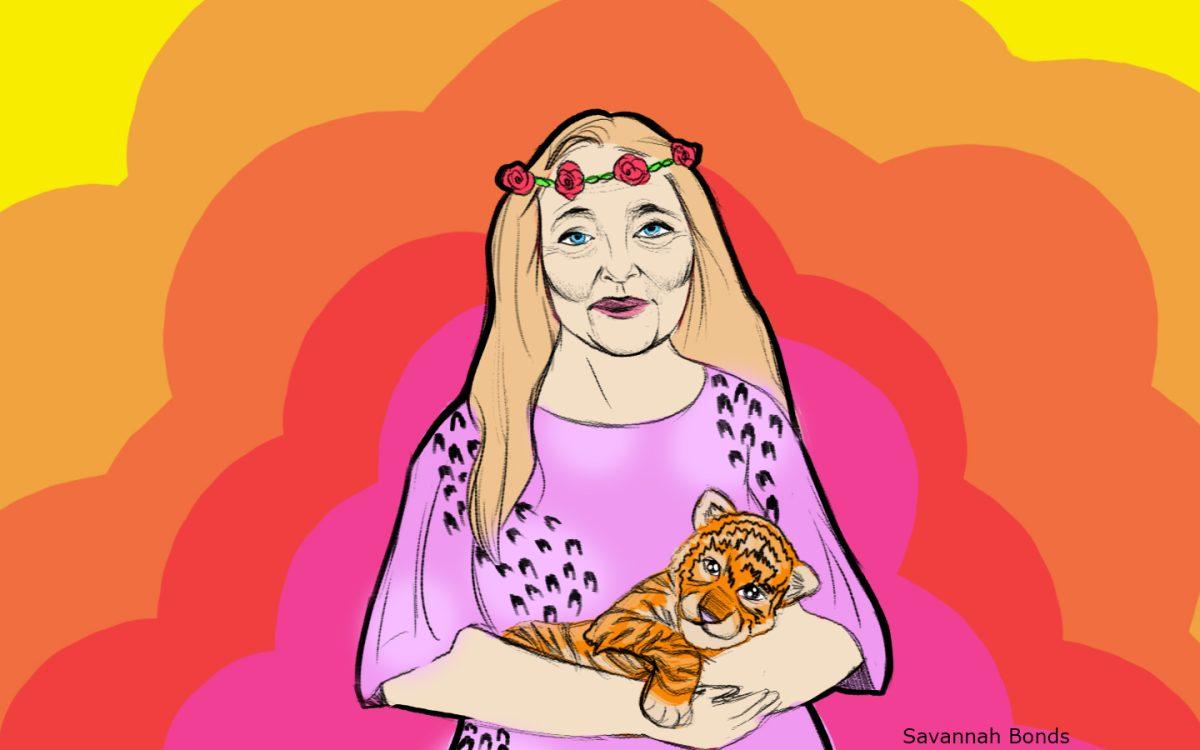Netflix’s docuseries ”Tiger King” continues to be ranked as a quarantine favorite as it grasps and entertains audiences with its appalling, twisted plot lines and giant, sharp-toothed cats. Docuseries director Eric Goode allows onlookers to label their own protagonists and antagonists as he explores the big-cat industries in the U.S. but not without labeling his own.
Goode shows apparent favoritism towards zoo operator Joe Exotic, or Joseph Maldonado-Passage, by revolving his special around the now-convicted felon and by choosing to help outline the little-known industry for which Maldonado-Passage advocated. This American industry involved the selling, breeding and cub-petting of big cats for profit. Maldonado-Passage claimed his success through this line of business by opening the G.W. Exotic Animal Park which showcased not only big cats but other wildlife creatures such as wolves, bears and monkeys.
Within the visual representation of Maldonado-Passage’s life and career, Goode documented a key figure which resulted in Maldonado-Passage’s demise—Carole Baskin. Carole Baskin inevitably became the arch-nemesis of the controversial “Tiger King” due to their differing opinions on the big-cat industry and tiger breeding. Baskin’s passion lies in saving tigers from the dangerous treatment which can fall upon them in facilities like Maldonado-Passage’s. Goode documents Baskin as she dedicates her time to releasing exposés aimed at destroying the big-cat industry.
As the documentary became more popular, Carole Baskin became a largely disliked individual across the U.S. Many praised the likes of Joe Maldonado-Passage, and he was soon deemed a popular icon while Baskin became a national villain. According to Hannah Frishberg with the New York Post, the amount of death threats and visitors which Baskin and her husband receive cause them to be isolated within their homes, as the sanctuary outskirts are filled with potential harm.
The national response to these characters causes me to ask the question: Why is Carole Baskin deemed the villain? Baskin is a woman who has dedicated her time to the safety of feline-specific wildlife and has used her fortune to benefit the world around her by protecting these animals with her Big Cat Rescue sanctuary. Joe Maldonado-Passage plotted a murder-for-hire plan and continuously illegally sold, killed and misused tigers for profit.
Instead of focusing on the good which Carole Baskin has brought to the world and wildlife, Goode focuses in on Carole’s past and her former relationship gone wrong. The disappearance of her former husband is explored and Baskin is pinned as the main suspect through unreliable resources and false accusations, some of which Baskin proves to be false on her Big Cat Rescue website. Goode wants his audience to view Baskin as the documentary does, but we should refrain from letting him paint our view of Carole.
Willa Paskin of Slate outlines the unfair negative image Goode portrays of Baskin and examines the instances where Baskin has morally shined, such as when she “lobbied Congress to pass a law forbidding the breeding and petting of tigers.”
Baskin is portrayed as a joke, and any viewer can witness how the show completely overshadows any act of conservation in which Baskin has participated. Instead, the villain persona is pushed upon this strong-willed woman, and Goode continues to allow actual criminals to hold on to the hero’s title. Goode provides footage and content which resembles more of a reality show and less of a documentary pertaining to tigers and the problem of big-cat industries in America.
Why does Eric Goode want us to favor a criminal over a conservationist? Why should we value the character of a racist animal abuser over the character of a gentle, tiger-loving woman? Why are Americans ignoring the obvious moral issue of Joe Exotic’s ideals and finding him entertaining instead of repelling?
Joe Exotic is the hero because of the light in which “Tiger King” was produced. Goode’s intentions were to make any individual feel a type of pity for Joe Exotic and his ridiculously bold attempts at becoming famous. Maldonado-Passage’s efforts at success are scourged with illegal acts, offensive backlash at Carole Baskin and damaging effects to the wild tiger population which continues to decrease, as they are held captive or harmed by the human population worldwide.
Rachel Nuwer of Longreads claims Joe Exotic would have continued to profit from cubs, evade enemies and avoid the law if Carole Baskin had not gotten involved. We should be thanking Carole Baskin for her involvement in wildlife protection and look to her as an example of beneficial advocacy. Carole Baskin is going out of her way to protect creatures by bringing them out of harm’s way, so let us refrain from disliking sweet Carole Baskin out of a careless regard to seem trendy.























































































